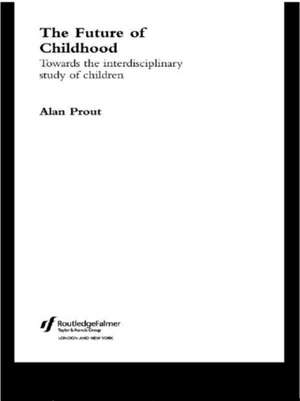The Future of Childhood
Editat de Alan Prouten Limba Engleză Paperback – 16 dec 2004
- the changing social and cultural character of contemporary childhood and the weakening boundary between adulthood and childhood
- a look back at the emergence of childhood studies in the nineteenth and twentieth centuries
- the nature/culture dichotomy
- the role of material artefacts and technologies in the construction of contemporary childhood.
| Toate formatele și edițiile | Preț | Express |
|---|---|---|
| Paperback (1) | 384.59 lei 6-8 săpt. | |
| Taylor & Francis – 16 dec 2004 | 384.59 lei 6-8 săpt. | |
| Hardback (1) | 1271.75 lei 6-8 săpt. | |
| Taylor & Francis – 10 dec 2004 | 1271.75 lei 6-8 săpt. |
Preț: 384.59 lei
Nou
Puncte Express: 577
Preț estimativ în valută:
73.59€ • 76.83$ • 60.91£
73.59€ • 76.83$ • 60.91£
Carte tipărită la comandă
Livrare economică 04-18 aprilie
Preluare comenzi: 021 569.72.76
Specificații
ISBN-13: 9780415256759
ISBN-10: 0415256755
Pagini: 184
Ilustrații: black & white illustrations
Dimensiuni: 156 x 234 x 10 mm
Greutate: 0.34 kg
Ediția:1
Editura: Taylor & Francis
Colecția Routledge
Locul publicării:Oxford, United Kingdom
ISBN-10: 0415256755
Pagini: 184
Ilustrații: black & white illustrations
Dimensiuni: 156 x 234 x 10 mm
Greutate: 0.34 kg
Ediția:1
Editura: Taylor & Francis
Colecția Routledge
Locul publicării:Oxford, United Kingdom
Public țintă
Postgraduate, Professional, and UndergraduateNotă biografică
Alan Prout is Professor of Sociology and Director of the ESRC Children 5-16 Programme, University of Stirling.
Recenzii
'A short book of formidable intelligence.' - Nicholas Tucker, Times Educational Supplement
'The Future of Childhood [is] an interesting mediation on what exactly the 'child' is that lies at the heart of research on children and childhood, and its attempt to break down the culture-nature binary by actually engaging with science certainly offers something new to contemporary debates on this much larger question.' - Children's Geographies
'This book studies in great detail the role and place of children and childhood in contemporary and future society. Due to profound social, demographic and economic changes, the social context and circumstances in which children grow up today have become very diverse. The new complexity of (modern) life has had great impact on the life of children. Prout takes this as the basis from which to rethink the methods of and theoretical approaches to childhood studies.'
- Journal of Contemporary European Studies, Vol. 14, No. 2, 273–313, August 2006
'This theoretically sophisticated book provides excellent resources and arguments for the debate on childhood and childhood studies today and in the future.' - Nicole Klinkhammer, Youth Welfare Service, Munich, Germany
'The Future of Childhood [is] an interesting mediation on what exactly the 'child' is that lies at the heart of research on children and childhood, and its attempt to break down the culture-nature binary by actually engaging with science certainly offers something new to contemporary debates on this much larger question.' - Children's Geographies
'This book studies in great detail the role and place of children and childhood in contemporary and future society. Due to profound social, demographic and economic changes, the social context and circumstances in which children grow up today have become very diverse. The new complexity of (modern) life has had great impact on the life of children. Prout takes this as the basis from which to rethink the methods of and theoretical approaches to childhood studies.'
- Journal of Contemporary European Studies, Vol. 14, No. 2, 273–313, August 2006
'This theoretically sophisticated book provides excellent resources and arguments for the debate on childhood and childhood studies today and in the future.' - Nicole Klinkhammer, Youth Welfare Service, Munich, Germany
Cuprins
1. Changing Childhood in a Globalizing World 2. Childhood Studies and the Modern Mentality 3. The Dualities of the Social 4. Childhood Nature and Culture 5. The Future of Childhood
Descriere
Alan Prout discusses the place of children and childhood in the late modernity. He argues that there appears to be a greater cultural confusion about the form that childhood should take.












